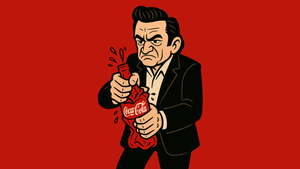The Johnny Cash estate has sued Coca Cola under Tennessee’s new ELVIS Act, which received a lot of attention when it was passed in March last year because it set out to ensure performers could protect their voice and likeness in the context of AI.
However, Coke is accused of violating the new law not by employing new-fangled AI technologies, but by hiring a good old fashioned sound-a-like singer to perform the soundtrack for a new ad.
The Cash estate accuses Coke of “pirating Johnny Cash’s voice in a nationwide advertising campaign to enrich itself”, and doing so “without asking for permission or providing any compensation to the humble man and artist who created the goodwill from which Coca-Cola now profits”. It then adds, “stealing the voice of an artist is theft - it is theft of his integrity, identity and humanity”.
The ELVIS Act - or Ensuring Likeness Voice And Image Security Act - amended existing laws relating to publicity rights in the state of Tennessee. With the emergence of AI models that can imitate voice and likeness, so called publicity rights - sometimes known as image or personality rights in other countries - have been increasingly in the spotlight.
It’s generally thought publicity rights, where available, could enable performers to stop the authorised use of their voice or likeness in AI-generated content, though there remains plenty of ambiguity as to exactly how that would work. The ELVIS Act was an attempt to remove the ambiguity within Tennessee, ensuring performers have the protection they need when it comes to AI voice clones and deepfakes.
However, the Tennessee laws don’t just protect voice and likeness where AI has been used. And publicity rights have been enforced before in the US to stop brands employing sound-a-like singers to imply they have worked with a known artist on a campaign when they have not.
The most famous case, cited in the Cash estate’s litigation, was between Bette Midler and the Ford car company, fought out in the Californian courts in 1988. Midler ultimately won that case.
Of course, when Coke put out its new ad in August this year soundtracked by vocals that sounded very like Cash, no one could have inferred that the fizzy drinks brand had formed a new partnership with the late musician, who died in 2003.
However, they might have thought Coke had unearthed a previously unreleased Cash track - or that they had partnered with his estate to utilise some of that super buzzy AI nonsense. But, according to the Cash estate’s lawsuit, Coke actually hired a Johnny Cash tribute act to perform the vocals on its new song.
Coke’s ad agency, the estate claims, “selected the sound-a-like singer” for “the specific purpose of ensuring that the infringing ad sounded as close as possible” to Cash’s voice. And in doing so “tricked consumers into believing that the infringing ad contained the actual voice of Johnny Cash”.
“On information and belief”, the state then continues, the chosen sound-a-like performer’s “only entertainment talent as a singer is to impersonate Johnny Cash”. And when said performer posted about the Coke ad on his social media, he included the hashtag #johnnycash.
Responses to that social media post are also used in the estate’s legal claim, as fans of Cash told the tribute singer that, when they first saw the new Coke commercial, they initially thought they were listening to a Cash track they had somehow never heard before.
“The singing voice in the infringing ad is readily identifiable and attributable to Johnny Cash”, the lawsuit goes on. “Through the infringing ad”, it adds, “Coca-Cola knowingly used and infringed” Cash's voice for “the purpose of advertising its products, merchandise, goods and services”.
“Coca-Cola exploited the voice in the infringing ad without authorisation” from Cash’s estate, the lawsuit concludes, and therefore “Coca-Cola violated the ELVIS Act”, and it did so “intentionally, fraudulently, maliciously, and/or recklessly”.
Needless to say, the Cash estate now wants lots of cash. Coke cash that is.

